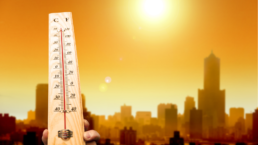By Lina Tran, Grist
This story was originally published by Grist. You can subscribe to its weekly newsletter here.
It’s just a few days into summer, and heat waves have already toppled records across the globe, from the Russian Arctic to the muggy Gulf Coast. With July and August — usually the hottest summer months — still to come, the early extreme heat offers a grim picture of summer’s growing danger.

Heat has gripped much of the United States over recent weeks. In mid-June, thousands of records were broken from coast to coast as a heat dome settled over the West and slinked east. Since June 15, at least 113 weather stations across the U.S. have registered temperatures that tied or broke record highs. Nightfall has offered little relief, as climate change has made nighttime warmer and warmer.
“These temperatures are occurring with only 2 degrees Fahrenheit of global warming and we are on track for 4 degrees Fahrenheit more warming over this century,” Andrew Dessler, a Texas A&M University climate scientist, told the Associated Press. “I literally cannot imagine how bad that will be.”
After a heat wave broiled the Pacific Northwest last year, Dessler told Grist that there’s so much evidence to show climate change inflames heat waves, it’s now safe to assume that all heat waves are more severe or likelier because of the carbon humans have put into the atmosphere.
Last week, oppressive heat and humidity blanketed the South, bringing heat indexes up to 115 degrees across Florida, Alabama, and Georgia. In Jackson, Mississippi, high demand for water, combined with outdated infrastructure, led to low water pressure in the system and a resulting boil-water advisory. Even the northern cities of Minneapolis and Milwaukee reached above 100 degrees, causing roads to buckle and subsequent traffic jams under the hot solstice sun.
Across the Atlantic, a heat wave over western Europe mired France and Spain in temperatures over 104 degrees. After a long period without rain, and under high winds and low humidity, it didn’t take long for fires to break out in Spain and Germany.
Meanwhile, China and Japan have also set blistering new records. On Saturday, Isesaki, a city about 70 miles northwest of Tokyo, reached 104.4 degrees — the highest temperature in June ever measured in Japan. In Tokyo, where temperatures in the 90s are expected to persist for the rest of the week, residents have been instructed to conserve energy after spikes in demand stoked concerns over power outages. The same heat wave smothered eastern China, where some 25 weather stations in the province of Hebei, near Beijing, notched their hottest day ever for any month, ranging from 109.6 to 111.6 degrees.
Even the Arctic hasn’t escaped the sweltering heat: The Russian city of Norilsk, above the Arctic Circle, hit 89.6 degrees on Thursday, setting a new record for its hottest June day and tying with the highest temperature on record.
On Monday, the National Weather Service said this week should bring relief and rain to some. “Areas of the Pacific Northwest and Lower Mississippi Valley that have experienced record high temperatures recently will be cooling down,” the forecast said. Meanwhile, a “hot spell” will be building over the Northern and Central Plains in the next few days.
According to a recent survey, a little more than half of Americans say they have been personally affected by extreme heat. That number is much higher in California, where 71 percent of the survey respondents say it has affected their lives, whether through climbing electricity bills or declining health. After this summer, it may spike higher still.
Recent Posts
Mayor Mamdani’s First Day, A Zero Hour Conversation With Richard Wolff
July 2, 2025
Take Action Now If elected, what would Mayor Mamdani do on his first day in City Hall? How would a democratic socialist govern as a big-city mayor?……
The U.S. Is Funding A Bloodbath At Gaza Aid Centers
July 2, 2025
Take Action Now The admin just gave $30M to GHF, the organization at the center of charges that Israel is weaponizing assistance and shooting at…
Feeding The Warfare State
July 1, 2025
Take Action Now We Lose, the Weapons Makers WinBy William D. Hartung, Tom Dispatch The Senate is on the verge of passing the distinctly misnamed…
The Rage Of Billionaires And The Frenzy To Stop Zohran Mamdani From Becoming New York’s Mayor
June 30, 2025
Take Action Now The constellation of forces now regrouping with a vengeance includes titans of Wall Street, enormous real estate interests,…




